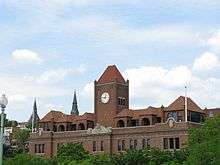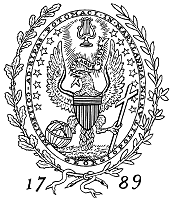McCourt School of Public Policy
|
Seal of Georgetown University | |
| Type | Private |
|---|---|
| Established |
1990 (GPPI) 2013 (MSPP) |
Parent institution | Georgetown University |
| Affiliation | Roman Catholic (Jesuit) |
| Dean | Edward B. Montgomery |
| Students | 450 |
| Location | Washington, D.C., USA |
| Campus | Urban |
| Nickname | MSPP |
| Website |
mccourt |
The McCourt School of Public Policy (MSPP) is one of nine schools of Georgetown University in Washington, D.C.[1] The McCourt School offers master's degrees in public policy, international development policy, policy management,[2] and policy leadership[3] as well as administers several professional certificate programs [4] and houses fifteen affiliated research centers.[5] The McCourt School has twenty-one full-time faculty members, ten visiting faculty members, more than one-hundred adjunct faculty members and approximately 450 enrolled students across the various degree and executive education programs.
The school is based in Old North, the oldest academic building on the main Georgetown University campus.[6] Formerly known as the Georgetown Public Policy Institute (GPPI), the McCourt School became Georgetown University’s ninth school in October 2013 as a result of a gift from Georgetown University alumnus Frank McCourt.[7]
The school is led by Edward B. Montgomery, who became Dean of GPPI in August 2010.[8] Montgomery was preceded by interim Dean William T. Gormley.
History

Establishing a public policy school in Washington, D.C. originated as an idea in the Georgetown University Department of Government and Economics in the late 1970s.
In 1980, the Government Department instituted a certificate program and in 1982 hired two junior faculty members to teach courses in public policy. For the next five years, the Public Policy Program expanded, granting a master's degree program in government with a concentration in public policy to approximately 15 students. In 1985, the Government Department hired the first part-time director to help establish the framework for the Public Policy Program. By the late 1980s, enrollment in the program had grown to about 75 students.
In 1990, the new president of Georgetown University, Father Leo O'Donovan, S.J., prioritized the expansion of the Public Policy Program under the direction of the program's first full-time director, Colin Campbell S.J., a Georgetown professor of philosophy and politics. Dr. Campbell was charged with the task of significantly expanding the program's faculty, students, and facilities.
In 1996 the Public Policy Program was renamed the Georgetown Public Policy Institute.
Dr. Judy Feder was appointed Dean in 2001. Faculty, applications, enrollment, staff, and facilities all grew under Dr. Feder’s tenure. Most notably, three master's degree programs were added to the school: Master of Policy Management[2] degree for mid-career students in 2001, MPM-Public Service (MPM-PS)[9] for students from government agencies in 2004, and an evening program[10] to supplement the traditional Masters of Public Policy (MPP).
In 2013, the University announced a $100 million gift—the largest single gift in Georgetown University history—from alumnus Frank McCourt (C’75) for the establishment of the McCourt School of Public Policy, Georgetown's ninth school, and their first new one since the McDonough School of Business was formed in 1957.[7]
Under the leadership of current Dean Edward B. Montgomery, The McCourt School launched its first year in October 2013 and enrolled its first students in the Master of International Development Policy (MIDP) program[11] in the fall of 2012. The McCourt School launched the Executive Master in Public Policy Leadership[3] in 2014.
Academics
Master of Public Policy Degree
The Master of Public Policy (MPP) is a 48 credit hour program offered as both a two-year full-time and three year evening program.[12] The program's focus is designed to meet the needs of individuals desiring a strong analytical background, particularly those planning careers in public or private sector policy analysis and management.
Dual degrees
For the MPP degree, MSPP offers dual degree programs with Georgetown Law Center, McDonough School of Business, Walsh School of Foreign Service, and the Graduate School of Arts and Sciences, as well as with the University of Geneva, and HEC Paris:.[13]
- Master of Public Policy/Master of Business Administration (MPP/MBA)
- Master of Public Policy/PhD in Government (MPP/PhD)
- Master of Public Policy/PhD in Psychology (MPP/PhD)
- Master of Public Policy/Juris Doctor (MPP/JD)
- Master of Public Policy/ Master of Science in Foreign Service (MPP/MS)
- Master of Public Policy/ Master of Arts in German and European Studies (MPP/MA)
- Master of Public Policy/International Organizations MBA (MPP/IOMBA)
- Master of Public Policy/Master in Management (MPP/MiM)
Master of International Development Policy
The Master of International Development Policy (MIDP) is a 48-credit degree program. The curriculum of the program teaches the quantitative skills needed to formulate policy solutions with a focus on politics, management, and ethics of development.
Master of Policy Management Degree
The Master of Policy Management (MPM)[2] is a 36-credit hour degree program focused on analytics, management, and substance within specific policy areas. The Program is designed for policy professionals with five to seven years of substantial policy and/or management experience.
Executive Master in Policy Leadership
The Executive Master of Policy Leadership (EMPL)[3] is a 30-credit degree for currently employed professionals who have seven or more years of work experience in the policymaking arena and want to learn more about management and leadership in a public context.
Non-credit certificates
Certificate in Educational Leadership and Management[14] is a non-credit professional development certificate designed to help local and state education officials support and lead improvement efforts.
Customized executive education
These are customized training programs in a variety of topics: international and domestic public policy issue areas; Congress and the executive branch; leadership and management; program evaluation and quantitative methods; writing for public policy; political organizing and influence; as well as other topics.
International programs
MSPP offers a number of global learning opportunities including a dual degree with the University of Geneva, five study abroad options, a Spring Break immersion experience, and a sustainable development project.[15]
- University of Geneva, Switzerland
- HEC Paris, Paris, France
- The Hertie School of Governance, Berlin, Germany
- Fudan University, Shanghai, China (in collaboration with Queen's University, Ontario, Canada)
- Lee Kuan Yew School of Public Policy, National University of Singapore
Faculty
The McCourt School consists of 20 core faculty members, 10 visiting faculty members, and more than 100 adjunct faculty members.[16] A 2010 report by the Women in Public Policy group at the Goldman School of Public Policy found that of 10 leading public policy schools, that MSPP ranked #1 in the overall percent of tenured and tenure track faculty that are women (about 40 percent).[17]
Rankings
The 2012 U.S. News & World Report ranking of graduate programs in public affairs ranked The McCourt School in the 91st percentile of all programs in the nation at 23rd, tied with UCLA, University of Chicago, and UNC-Chapel Hill, among others.[18] MSPP ranked first in the Washington area in the specialty area of public policy at 15th; the School also ranked 12th in health policy and 17th in social policy. The McCourt School is not ranked by the National Research Council because it does not have a doctoral program.[19]
Student organizations
- Georgetown Public Policy Student Association: The Georgetown Public Policy Student Association (GPPSA) is the student government of MSPP. GPPSA facilitates communication among students, administration and faculty; organizes academic, professional, social, and community service initiatives; and provides support and funding for MSPP student organizations.[20]
- McCourt School Policy Conference: Each year, MSPP students work together to plan an annual public policy conference. The event brings distinguished academics and policymakers to Washington, D.C. to discuss the most pressing and complex social issues of the day.[21]
- Georgetown Public Policy Review: The Georgetown Public Policy Review (GPPReview) is MSPP's nonpartisan, student-run peer-reviewed academic journal. GPPReview’s mission is to provide an outlet for innovative new thinkers and established policymakers to offer perspectives on the politics and policies that shape our nation and our world. Approximately 50 dedicated staff members work to produce and promote this print publication, The Georgetown Public Policy Review as well as an online blog, GPPReview Online, to achieve this mission.[22]
- McCourt Policy in Practice: Since 2007, MSPP students have worked to develop a relationship with the residents of Roatán, Honduras. Four groups of students have now traveled to the island of Roatán over Spring Break to implement ongoing service and development projects. McCourt Policy in Practice used to be known as Project Honduras.[23]
- Public Policy OUT: Public Policy OUT (P-POUT) is the MSPP LGBT policy issue group whose vision is to provide a visible and public forum within the student body for discussion of LGBT issues. This includes both national and local policy issues, as well as issues facing LGBT individuals working in policy-focused careers. The group focuses specifically on education, networking, outreach, and awareness.[24]
- Women in Public Policy Initiative: MSPP's Women in Public Policy Initiative (WPPI) is dedicated to developing exceptional female leaders in public policy and increasing awareness of issues that disproportionately affect women and girls through strategic partnerships, service, and advocacy.[24][25]
- McCourt Energy and Environmental group (McCourt E&E): McCourt E&E engages students, academics, and practitioners on policy issues related to energy and the environment. Energy and environmental concerns are among the most important challenges facing policy makers today. Federal, state, and local lawmakers will all face policy choices related to climate change in the coming years. These may include how to: ensure coastal cities are resilient in the face of rising sea levels and storm surge, address reduced water supply in agriculture, find new sources of power that ensure an operational electric grid during natural disasters, increase energy efficiency in industrial, commercial, and residential sectors, address public health concerns by improving air and water quality, secure a sustainable food supply for growing populations, and much more. As graduate students at a premier public policy school located in Washington, D.C., we have an opportunity to engage at a high level and make a difference in this field. Now is also a critical time to enter this field as it forms, at the ground level, in order to build a community of engaged E&E policy students, academics, and professionals who can share ideas and brainstorm solutions. The policy proposals we come up with will strive to solve real world challenges. We will strive to create a cohort of leaders in environmental and energy policy that will take ideas into the real world upon graduation and make a significant difference addressing these challenges.[26][27]
Research centers, projects and organizations
The McCourt School’s affiliated centers are engaged in research, professional training, and sharing of information on Congress, health policies, and social policies.[28]
- Institute of Politics and Public Service (IPPS): Partake in the study of politics and the political process and engage in student-driven conversations with elected officials, policymakers, members of the media, and others.[29]
- The Government Affairs Institute (GAI): The Government Affairs Institute provides education and training about congressional processes, organization, and practices, and about selected legislative policy issues.[30]
- The Georgetown University Initiative on Innovation, Development and Evaluation (GUI²DE): Conducts empirical field-based research to assess the impact and effectiveness of interventions and policies aimed at empowering individuals in developing countries to improve their lives.[31]
- The Health Policy Institute: HPI is a multi-disciplinary group of faculty and staff conducting research on key issues in health policy and health services research, including health care financing, the uninsured, and health insurance reform.[32]
- Center for Children and Families: CCF is an independent, nonpartisan policy and research center whose mission is to expand and improve health coverage for America's children and families.[33]
- Center on Health Insurance Reforms (CHIR)[34]
- National Center for Education in Maternal and Child Health[35]
- National Maternal and Child Oral Health Resource Center (OHRC): OHRC supports health professionals, program administration and staff, educators, policymakers, and others working in states and communities with the goal of improving oral health services for infants, children, adolescents, and their families.[36]
- Health Information Group: The Health Information Group provides leadership in program development, educational resources, and innovative technology to improve health and well-being.[37]
- The Center on Education and the Workforce: The Center is an independent, nonprofit research and policy institute that studies the link between education, career qualifications, and workforce demands. The Center conducts research, engagement, and outreach to policymakers and practitioners.[38]
- The Center for Juvenile Justice Reform (CJJR): CJJR advances a balanced, multi-systems approach to reducing juvenile delinquency that promotes positive child and youth development, while also holding youth accountable.[39]
- The Center on Poverty, Inequality, & Public Policy: The Center on Poverty works with policymakers, researchers, advocates, and others to develop effective policies and practices to alleviate poverty and inequality in the United States. The Center's areas of anti-poverty work include: developing effective workforce and education policies and programs; improving outcomes for disadvantaged and disconnected youth; and expanding and improving the Earned Income Tax Credit and other federal poverty-reduction programs.[40]
- The Center for Public and Nonprofit Leadership (CPNL): CPNL is a leading education, research and training center dedicated to the development of public, nonprofit and philanthropic leadership.[41]
- The Center for Research on Children in the United States (CROCUS): CROCUS focuses on policy issues related to children, including early childhood education, pre-K programs, Head Start, and child care programs.[42]
- Edunomics Lab: Edunomics Lab is a research center exploring and modeling complex education fiscal decisions. The center tracks public funds in K-12 and higher education systems to the point of service and examines the effects of policy decisions on the allocation of resources across students and services[43]
References
- ↑ http://mspp.georgetown.edu/
- 1 2 3 http://mccourt.georgetown.edu/academics/mpm/
- 1 2 3 http://mccourt.georgetown.edu/academics/empl/
- ↑ http://mccourt.georgetown.edu/ExecEd/
- ↑ http://mccourt.georgetown.edu/research-centers/
- ↑ http://maps.georgetown.edu/oldnorth/ Profile of Old North
- 1 2 Anderson, Nick (September 18, 2013). "Ex-Dodgers owner McCourt gives Georgetown $100 million to launch public policy school". The Washington Post. Retrieved September 18, 2013.
- ↑ http://explore.georgetown.edu/news/?ID=51126 Pugh, Rachel. "New Dean of Public Policy Named" Georgetown University. 10 June 2010.
- ↑ http://mspp.georgetown.edu/academics/mpm-ps/
- ↑ http://mspp.georgetown.edu/MPP_Evening_Program/
- ↑ http://mccourt.georgetown.edu/academics/midp/
- ↑ http://mspp.georgetown.edu/academics/mpp/ Masters in Public Policy
- ↑ http://mspp.georgetown.edu/academics/dual-degrees/ Dual Degree Programs
- ↑ http://mccourt.georgetown.edu/execed/elm/
- ↑ http://mspp.georgetown.edu/academics/international-programs/ International Programs
- ↑ http://mspp.georgetown.edu/faculty-directory/ List of MSPP Faculty
- ↑ http://gspp.berkeley.edu/students/docs/WiPP_Faculty_Report.pdf Bonaguro, Joy, Christine Frey, Tara Regan, Felicity Rose, and Kathy Wilson. (2010) "Women in Public Policy: A Framework for Greater Faculty Diversity." Women in Public Policy group at Goldman School of Public Policy, University of California, Berkeley. http://gspp.berkeley.edu/students/wipp.html
- ↑ "Graduate School Rankings in Public Affairs". US News and World Report.
- ↑ http://sites.nationalacademies.org/pga/resdoc/pga_051962 Research Doctorate Program Rankings FAQ
- ↑ http://www.gppsa.org GPPSA website
- ↑ http://www.mspconference.org/
- ↑ http://www.gppreview.com Georgetown Public Policy Review
- ↑ http://mspp.georgetown.edu/project-hondura/
- 1 2 http://mspp.georgetown.edu/current-students/student-orgs/ MSPP Organizations
- ↑ http://www.wppigppi.org
- ↑ "McCourt E&E". Medium. Retrieved 2016-12-01.
- ↑ "McCourt E&E | Facebook". www.facebook.com. Retrieved 2016-12-01.
- ↑ http://mspp.georgetown.edu/research-centers/ MSPP Research Centers
- ↑ "Institute of Politics and Public Service". Georgetown University.
- ↑ http://gai.georgetown.edu The Government Affairs Institute
- ↑ http://gui2de.georgetown.edu GUI²DE
- ↑ http://ihcrp.georgetown.edu/ The Health Policy Institute
- ↑ http://ccf.georgetown.edu/ Center for Children and Families
- ↑ http://chis.georgetown.edu/ Center on Health Insurance Reforms
- ↑ http://www.ncemch.org National Center for Education in Maternal and Child Health
- ↑ http://www.mchoralhealth.org/ National Maternal and Child Oral Health Resource Center
- ↑ http://www.healthinfogroup.org/ Health Information Group
- ↑ http://cew.georgetown.edu/ The Center on Education and the Workforce
- ↑ http://cjjr.georgetown.edu/index.html The Center for Juvenile Justice Reform
- ↑ http://www.law.georgetown.edu/academics/centers-institutes/poverty-inequality/ The Center on Poverty, Inequality, & Public Policy
- ↑ http://cpnl.georgetown.edu/ The Center for Public and Nonprofit Leadership
- ↑ http://www.crocus.georgetown.edu/ The Center for Research on Children in the United States
- ↑ http://edunomicslab.org/
External links
Coordinates: 38°54′27″N 77°4′24″W / 38.90750°N 77.07333°W

